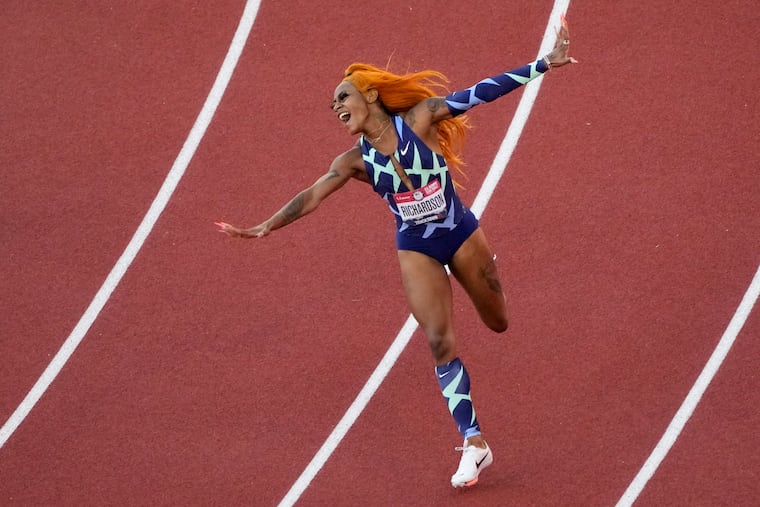Cheer for Black girls with orange hair, long nails, tats, and lashes | Opinion
A gentle reminder to support women who look like Sha’Carri Richardson, even when they’re not elite athletes.

Years in the future, when people see the video of runner Sha’Carri Richardson rocketing through 100 meters in 10.65 secs, it will resonate exactly the way it did over the last few days — with overwhelming joy and honor for her.
Richardson, a 21-year-old track star, made headlines on Saturday after qualifying for the Tokyo Olympics, winning the women’s 100-meter race at the U.S. Olympic Track and Field Trials in Eugene, Ore. Her exuberant victory declaration, the subsequent emotional interview, and her beautiful collapse into the arms of her grandmother were shared around the world.
» READ MORE: Sha’Carri Richardson drug test: What we know and don’t know
For me, I will always remember how in a matter of seconds I came to know her in that way that Black women know each other. The way our shared experience binds us and allows us to know the whole story in a few words. “Stop playin wit me,” she said. “I’m here,” she said.
Who among us doesn’t know these sentiments intimately? And so Sha’Carri is our sister, our daughter, our bestie, our cousin, our niece. When Black people take you as kin, this becomes quite serious business.
Even as she started her iconic race, the shade and doubts of the announcer questioned her speed but also condescended toward her signature style. Flaming orange lace front wig, full set of long acrylic nails, tattoos, and, of course, the confidence of a champion. The commentator listed these characteristics as if they were a liability juxtaposed alongside her speed. “The hair, the nails, the attitude … but the speed.”
As always we didn’t need anyone’s permission to cheer for all of her. We knew that all of her was Black excellence. We all seemed to win in that moment and give a collective “na nanny boo boo” to mainstream sports media. Same as we did for Naomi Osaka and Simone Biles in recent weeks. We came to bat for Sha’Carri, and rightfully held space for and celebrated her well-deserved victory.
» READ MORE: Don’t play respectability politics with Black women over their fashion choices | Jenice Armstrong
I was proud of the way we protected her, but in that moment my heart also began to sink.
Do we protect all of our girls? What of the girls off the field who need our figurative and literal human wall of protection? Do we only reserve this support for our girls who end up on the world stage?
It was clear and evidenced by Richardson’s grandmother’s embrace that she was, champion or not, deeply loved just the way she was and by her own words the reason she became a champion to begin with. Every Black girl and woman deserves this.
Every day our girls, in all their colored hair, acrylic nail glory, are profiled, punished, and scrutinized. They are given less empathy. They are sexualized and scolded, often by older Black people in addition to known racist people and systems.
These prejudices have real and measurable circumstances everywhere — education, health care, employment, cultural appropriation, and the legal system. In a season when we are exploring so many of the finer points of how white supremacy shows up, when we are exercising and learning to push back against the attempts at respectability that never truly protect us, I offer this, a gentle reminder to love and cheer for Black girls with orange hair, long nails, tats, and lashes, even when they aren’t the fastest woman in the country.
Our girls are in desperate need of our love even when they are not performing the brilliance we deem worthy of it. I wanted us to remember and carbon-copy what love looked like for Sha’Carri Richardson, and spread it far and wide.
Aja Graydon is a vocalist who forms half of the American neo soul duo Kindred the Family Soul. She also cohosts J.ill the Podcast with Jill Scott and Laiya St. Clair.